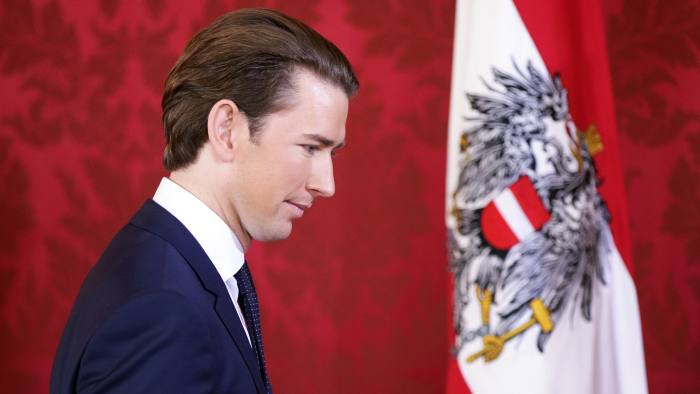Today Mr Kurz, elected chancellor in October aged just 31, is preparing to take the helm of EU politics in July when Austria assumes the bloc’s revolving presidency. And Vienna’s youthful leader seems ready to bring his iconoclastic spirit to brokering deals in Brussels.
“The closing of the western Balkan route was successful and we did not have the support of Germany, France or bigger countries in the EU,” Mr Kurz tells the Financial Times. “I think if there is enough political will and power, there’s the chance to change something.”
Security and protecting Europe’s external borders top Mr Kurz’s presidency priorities — and controversially he is ready to call time on Ms Merkel’s push for mandatory EU quotas for refugees.
The EU had “wasted time” on the divisive issue, he says. “We need to shift our focus from the debates about redistributing refugees within the EU, and should concentrate more on external border protection.”
Germany, he points out, now has “a completely different position” on border control compared to 2015 or 2016. “I think they’ve changed their position in the right direction but what we need now is to stop all these debates and to start to get things done.”
It is typical Kurz-style — courteous, well thought-out, but uncompromising. With Austria holding an entrenched position on many EU files, from migration and frugality on the Brussels budget to its calls to stop enlargement for Turkey, it sets the stage for an unorthodox presidency.
Mr Kurz generated international headlines in December, when he forged a coalition deal with Austria’s fiercely nationalist Freedom party, one of Europe’s best established populist parties. But the Freedom party’s Eurosceptic instincts were curtailed in the 182-page government programme they signed in December. “There is no doubt that our government is pro-European,” Mr Kurz says.
Nevertheless, the Austrian chancellor often distances himself from the EU’s big powers, and instead casts himself as “bridge builder” to eastern European neighbours such as Hungary. A reason for recent tensions within the EU is, he says, “that some countries think that they act in a more moral and better way than others, that western European countries sometimes look down on eastern European countries.”
Early evidence of his willingness to set his own agenda will come in June when Russian president Vladimir Putin is scheduled to visit Austria. While the west toughened its stance on Russia, Austria has stressed its historical neutrality, although the Freedom party has a pact with Mr Putin’s United Russia party.
Mr Kurz argues Austria’s position is constructive. “We won’t be able to solve the crisis in Ukraine alone . . . Syria, we will only be successful if we find a way to act united with the US and Russia, so I think it’s not negative for the EU if countries like Austria — which has always been a bridge-builder — has . . . a good relationship with Russia.”
Similarly, Mr Kurz has aligned himself with Hungarian prime minister Viktor Orban on migration, while being less forthcoming with any concerns he may have about the state of Hungary’s democracy. In 2015, Mr Orban was criticised for saying Europe’s policy on migration was wrong. “Two years later many countries had to change their positions, and if they were honest they would say that their position in 2015 and 2016 was wrong and made the crisis not smaller but bigger.”
Some in Brussels worry Austria, which other EU countries attempted to ostracise in 2000 when the Freedom party was previously part of the federal government, may drag its heels when handling Poland’s stand-off with Brussels over rule of law. Mr Kurz insists he would not hesitate, while holding the EU presidency, to call a vote to censure Warsaw if required.
He also takes a tough line on Turkey.
Turkey “no longer fulfils the political Copenhagen criteria” he says, referring to standards on democracy and rights for aspiring EU members.“ We therefore urge that accession negotiations with Turkey should be stopped”. It is another vote Mr Kurz will be handling as the presidency.
Closer to Austria’s borders, Mr Kurz might have found support for a rethink on EU migration policy from the populist coalition that had been poised to govern in Italy until Rome talks reached deadlock on Sunday night. But he worries about expansionary fiscal policies from any incoming Italian government.
“We saw in Greece how dangerous it is if a country has a bigger and bigger debt and I hope that we will not have a second Greece in our neighbouring country, Italy.”
Mr Kurz’s experience working with populist politicians at home could help as he navigates a presidency that is likely to be punctuated by the EU’s disputes with the UK over Brexit, as well as tensions between the EU and US administration of Donald Trump.
Mr Kurz describes Brexit as “a terrible decision”, suggesting the EU’s migration cause was a “main reason” for the vote.
On Mr Trump’s administration, however, his message is one that should please other EU capitals, who worry about Vienna’s sometimes disruptive tone. “The US has become more and more unreliable for us,” the Austrian chancellor says. “The most important thing is that Europe has to remain united.”
















































